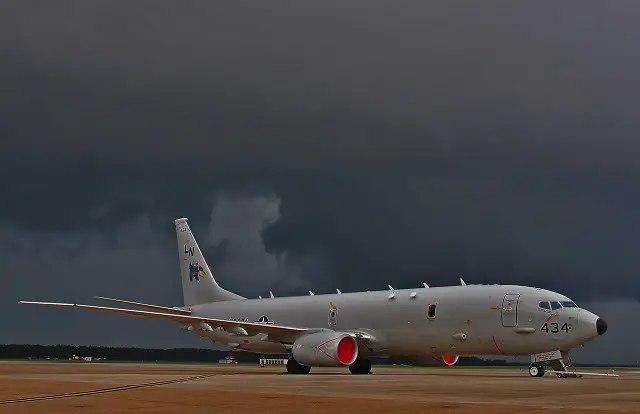Breaking news
U.S. Navy awards full rate production contract for U.S Navy and Australian P-8A MPA.
| |
|||
| a | |||
Naval Forces News - USA |
|||
U.S.
Navy awards full rate production contract for U.S Navy and Australian
P-8A MPA |
|||
The U.S. Navy announced Aug. 14 the award, to Boeing Defense and Security
Systems, of a $295.6 million firm fixed-price-contract for the procurement
of 12 Full Rate Production (FRP) Lot 2 P-8A
Poseidon Multi-Mission Maritime aircraft for use in the U.S.
Navy and Royal Australian Air Force fleets. The U.S. Navy will receive eight aircraft and the RAAF will receive four. |
|||
 P-8A Poseidon Maritime Patrol Aircraft from Patrol Squadron 45 "Pelicans" based at NAS Jacksonville. Picture: US Navy |
|||
“We are extremely excited about this contract
award because it not only will continue to deliver P-8s to the U.S.
Navy, but it also will deliver the initial set of P-8s to the Australian
government,” said Capt. Scott Dillon, the Maritime Patrol and
Reconnaissance Aircraft Program Office's (PMA 290) program manager.
“The future of the Maritime Patrol and Reconnaissance community
is continuing to make history with the 15 P-8As already delivered to
the U.S. Navy fleet, and now with our Australian cooperative program
partners.”
PMA-290’s cooperative partnership with Australia ensures that the Australian government has thorough access to information on the aircraft’s capability, cost, and development schedule. The Australian government will also use this collaborative information when making any decisions when acquiring the P-8 weapon system. Through PMA-290’s Joint Program Office (JPO), this cooperative program personnel (CPP) partnership is managed and allows for the collaboration in a series of improvements planned through the life cycle of the P-8. As part of the cooperative partnership, there were two active memorandums of understanding (MOU) produced: the first was implemented in April 2009 for Increment 2’s weapon systems development and the second was implemented in March 2012 for production, sustainment and follow-on development. Some of JPO’s other objectives are to foster a cooperative environment, to identify and investigate incremental development opportunities, establish cooperative project plans and processes, and manage projects to achieve memorandum of understanding objectives. “The partnership allows Australians to be embedded within the program office, and carries long-term advantages for the both the U.S. Navy and the RAAF,” Dillon said. “Cooperation also equips the members of the Australian team to support their own aircraft as their AP-3Cs retire.” According to Australian Wing Commander David Houghton, P-8 JPO program
manager, he has seen the U.S. Navy and RAAF gaining mutual benefit
from the sharing of experiences and capabilities that have been developed
within both services. |


























